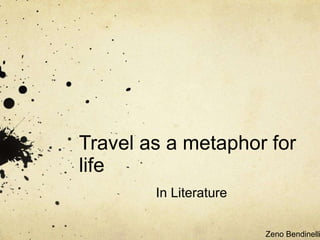Presentazione2
- 1. Travel as a metaphor for life In Literature Zeno Bendinelli
- 2. Travail of the Middle Not only in space is also seen thro Word "life" is most often associated with the w Different m Life is but a journey, to travel is to live twi (Omar Khayyam)
- 3. Travel as a mataphor for life in Literature Is one of the most frequent images The Odyssey of Homer sums the meanings of the journey The journey is a return trip (nostos) The stages of the return (in greek nostos) are twelve
- 4. ? The Ciconi ? The Lotus Eaters ? the cyclops Polyphemus ? Aeolus ? The Lestrigoni ? Circe and Hades ? Sirens ? Scylla, Charybdis and the island of Helium ? Calypso ? The Phaeacians ? Return to Ithaca
- 5. The journey can not consist only entering harbor at the port end ? The trip will become a test of knowledge ? The meaning of travel is mainly in its path ˇ°Il senso della ricerca sta nel cammino fatto e non nella m il fine del viaggiare ¨¦ il viaggiare stesso e non l'arrivare (Tiziano Terzani)
- 6. The sea voyage is indeed a metaphor for life. The existence (the ship) is bound to lose his leadership (the reason) At a symbolic level the open sea is the true provocative dimension where the wreck is always possible The journey becomes increasingly metaphor of abandonment
- 7. Free man, you will always cherish the sea! The sea is your mirror; you contemplate your soul In the infinite unrolling of its billows; Your mind is an abyss that is no less bitter. You like to plunge into the bosom of your image; You embrace it with eyes and arms, and your heart Is distracted at times from its own clamoring By the sound of this plaint, wild and untamable. Both of you are gloomy and reticent: Man, no one has sounded the depths of your being; O Sea, no person knows your most hidden riches, So zealously do you keep your secrets! Yet for countless ages you have fought each other Without pity, without remorse, So fiercely do you love carnage and death, O eternal fighters, implacable brothers! ? Charles Baudelaire L'Homme et la mer
- 8. The first literary character that modern relies on the law of the sea is Robinson CrusoeSo at sea begins his journey that becomes the challenge, need of adventure, desire for freedom, knowledge test, the new research, overcoming obstacles, evasion, but also adaptation, testing and verification of their experience Island of Despair The master of the island. In this sense, each of us is Robinson, also called to the boundless sea of knowledge and opportunity to find himself in the island of his own self.
- 9. Dante and the Divine ComedyA trip with an allegorical meaning Dante then equals and exceeds Odysseus XXVI chant Odysseus, in fact, is entrusted only to reason
- 10. The Grand Tour The journey of education and training DonˇŻt tell me how educated you ar Tell me how much you travelled. (Mohamed)
- 11. The myth of Ulysses, reinterpreted Because of the elements of openness and ambiguity that encloses Joyce's Ulysses You take delight not in a city's seven or seventy won but in the answer it gives to a question of yours. (Italo Calvino)
- 12. Ulysses and Odyssey, then, are used as key terms to address and to better understand our daily reality The journey thus encompasses a substantial polarity The journey never ends. Only travelers (Jos¨¦ Sarmago)
- 13. What does the prhase ˇ°I love to travelˇ± mean? ? Birth ? Adolescence ? Objectives The real voyage of discovery consists no seeking new landscapes, but in having n eyes. (Proust)
- 14. To infinity and beyond













